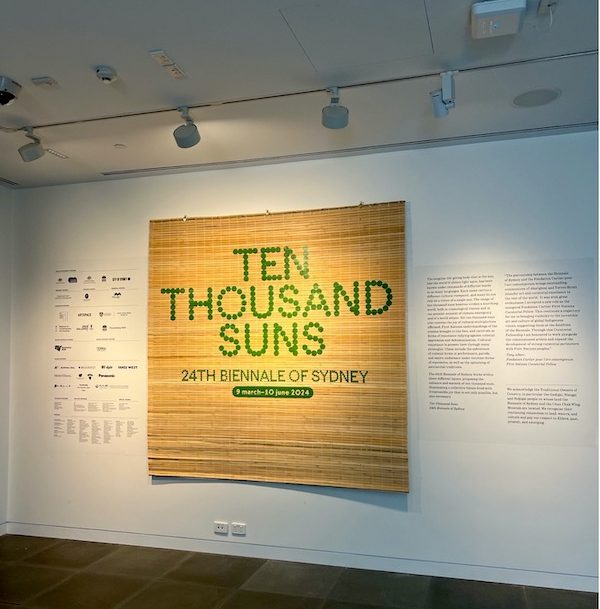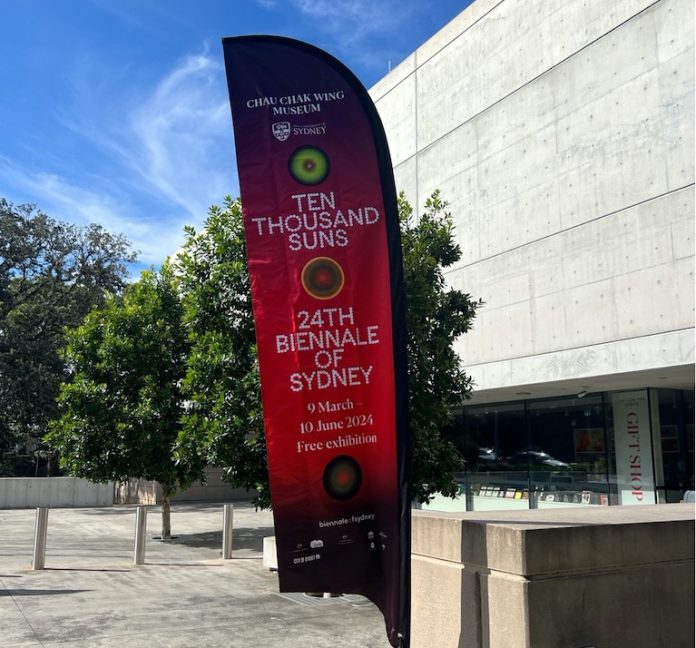The Biennale artwork Exodus, focusing on Indonesian traditional culture, received praise and resonated strongly with Indonesian students.
Exodus is an 18-minute video work showcased at the Chau Chak Wing Museum as part of the Sydney Biennale, one of the world’s leading contemporary art events.
The work’s focus is the combination of two traditional Indonesian arts, Dolalak dance from Central Java province and Indorock music from Indonesians in the Netherlands.
University of Sydney student Joshia Maldini said Exodus helped him and his Australian friends learn more about the rich Indonesian culture.
“When you mention Indonesia, most people in Australia think about Bali,”said Maldini. “I think it’s good to let more people know about Indonesia’s rich culture, not just Bali.”
Singaporean artist Choy Ka Fai directed the work. Choy has created several works centred around the traditional dance arts of Asia over the past decade.
Not of Indonesian descent, Choy expressed concern that the Indonesian audience might accuse him of stealing Indonesian cultures on Exodus.
“It could be easily accused of appropriating the different culture. And normally I get the most critical audience from the country of the people of their origins.”
The positive reaction from Indonesian students at the University of Sydney proved that the artist’s concern was unfounded.
Fasya Maudia, a student studying Master of Strategic Public Relations at the University of Sydney, said Choy’s work is meaningful.
“The outsiders sometimes appreciate our culture more than the people from the culture itself,” said Maudia.
 Under Choy’s Instagram post, many Indonesians expressed support for Choy’s work and pride in their traditional culture.
Under Choy’s Instagram post, many Indonesians expressed support for Choy’s work and pride in their traditional culture.
Exodus explores the complex relationship between Indonesian cultural identity, colonialism, and globalisation. The work also prompted Indonesian students studying abroad to reconnect with their cultural roots.
As a “100 per cent pure Indonesian,” Maudia said she never knew about the Dolalak dance until she saw Exodus, adding that she had a shallow knowledge of Indorock music.
She attributed this to the fact Indonesia has too many ethnicities and cultures and that many, like her, live outside Indonesia.
“Now I live in Australia I’m slowly leaving my original culture,” she said. “I don’t know much about traditional music, I know more about pop music … [and] the music from outside of my country.”
Maudia said her circle of friends faced the problem. “I think that’s the problem for our generation. I think my generation is slowly leaving our traditions and culture behind.”
 Choy acknowledges this reality saying that Exodus reflects the experiences of communities who have left their hometowns, whether by choice or force.
Choy acknowledges this reality saying that Exodus reflects the experiences of communities who have left their hometowns, whether by choice or force.
“I tried to use these three songs [in the video work] to talk about wandering… [They] reflect the difference in emotions or situations that people in a displaced community and culture face.”
He added that traditional Indonesian cultures were receiving less attention from Indonesian people.
“In Indonesia, if you ask a musician or a layman, they probably would not have heard of Indorock, but they could tell you more about K-pop,” he said. “That’s the reality of the world we live in.”
Asked what inspiration Exodus could offer to Indonesian students living and studying abroad, Choy said: “Just go back to Indonesia and see. I think it is there for you to go and search by yourself… to wander back.”
Choy also voiced a positive view of traditional art forms having joined social media platforms.
“What’s interesting for me to work with the TikTok famous Dolalak group was how they move into the space of the digital, the social media.”
Dewi Arum, the Dolalak dance group featured in Exodus, has over 1.8 million followers on TikTok.
Indonesia has the second-largest TikTok user base in the world with over 126 million users and the country’s traditional culture artists are now trying to reach a wider audience through social media platforms.
This may well be the answer for young Indonesian expatriots around the world. “I know some Indonesian cultures from TikTok. They’re now being brought up to the surface again, like in my generation,” said Maudia.


